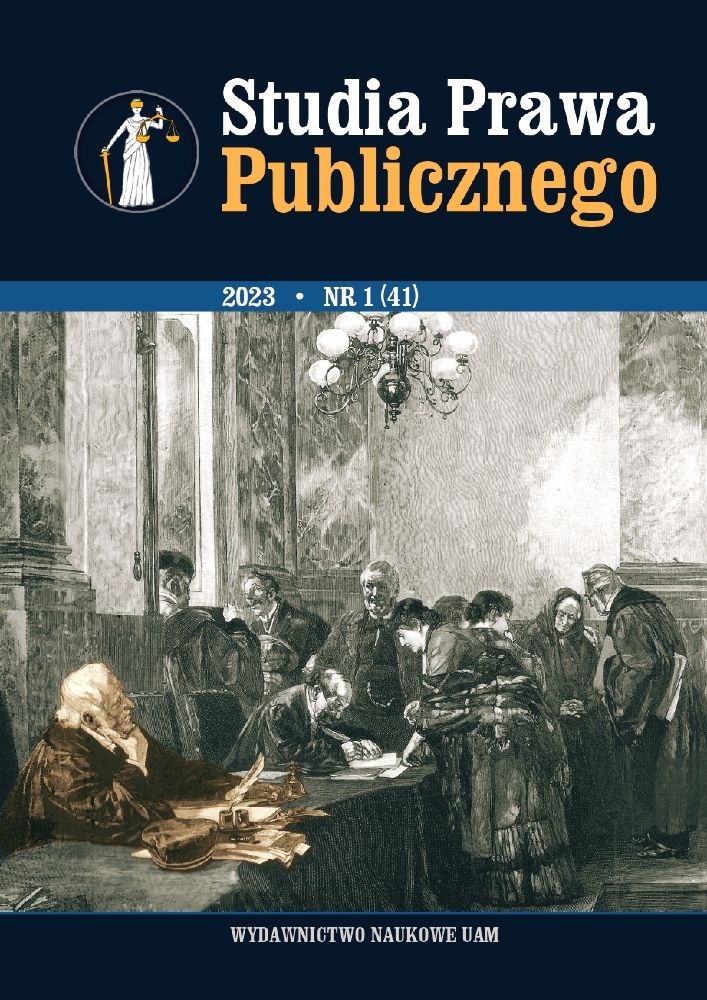Abstrakt
The aim of the article is to present the position of the voivode in the system of security authorities and public order in the voivodeship and its powers in relation to managers’ services, inspections and guards constituting the combined administration in the voivodeship. These powers developed since the introduction of the system reform in 1990 in relation to the creation of a dualism of local administrative bodies: local government at the commune level and local general government administration bodies. The basic rights of the voivode in the scope of safety and public order are currently defined in the Act of 23 January 2009 on the voivode and government administration in the voivodship. The Law the Police of 6th of April 1990 states that it is a body of security and public order at the voivodeship level, and that the voivodeship police chief represents the voivode in performing tasks in that regard, except for matters related to operational and exploratory investigations and prosecution of offences, as well as issuing individual administrative acts, if the laws so provide. The performance of tasks by the voivodeship police chief on behalf of the voivode does not mean, however, that the voivode is an official superior over the chief of police. Nor does grouping and superintendence imply the organisational inclusion of the auxiliary apparatus of the voivodeship chief of police in the provincial office, since it is the sovereign decision of the Chief Police Officer to determine the principles of organisation and the scope of action of chiefs. There is also no financial integration. The article also points out that the Act on the Voivode and Government Administration in the Voivodship defines the basic functions of the voivode, which include those related to public security and order in the voivodship. Particular tasks arising from these functions are defined by special laws, endowing the voivode with appropriate legal means for implementing these tasks, including authoritative means.
Bibliografia
Dobkowski J., Pozycja prawnoustrojowa służb, inspekcji i straży, Warszawa 2007.
Karpiuk M., Przepisy porządkowe jako szczególny rodzaj prawa miejscowego, „Studia Iuridica Lublinensia” 2015, nr 4, s. 21–34. DOI: https://doi.org/10.17951/sil.2015.24.4.21
Kasiński M., Dylematy działalności prawotwórczej wojewody, w: Legislacja administracyjna.
Teoria, orzecznictwo, praktyka, pod red. Z. Duniewskiej, M. Stahl, Łódź 2012, Lex/el.
Kasznica S., Polskie prawo administracyjne. Pojęcia i instytucje zasadnicze, Poznań 1946.
Maćkowiak J., Zmiany w organizacji i funkcjonowaniu terenowej administracji rządowej (próba oceny), „Państwo i Prawo” 1998, nr 2, s. 20–37.
Pakuła A., Rola terenowej administracji publicznej w zapobieganiu sytuacjom kryzysowym, „Przegląd Prawa i Administracji” 2016, t. 106, s. 123–134. DOI: https://doi.org/10.19195/0137-1134.106.12
Pieprzny S., Ochrona bezpieczeństwa i porządku publicznego w prawie administracyjnym, Rzeszów 2007.
Pieprzny S., Zmiany prawno-organizacyjne w Policji w latach 1990–2007, w: Policja w Polsce. Stan obecny i perspektywy, t. 1, pod red. A. Szymaniaka, W. Ciepieli, Poznań 2007, s. 95–119.
Przygodzka J., Ewolucja systemu finansowania Policji w aspekcie współpracy z jednostkami samorządu terytorialnego, w: Policja w strukturach administracji publicznej. Materiały poseminaryjne, pod red. A. Babińskiego, B. Bogdalskiego, Szczytno 2005.
Stec M., Ustrój samorządu terytorialnego w Polsce. Materiały szkoleniowe, z. 2, Warszawa 1998.
Ura E., Funkcje wojewody, „Rzeszowskie Zeszyty Naukowe. Prawo, Ekonomia” 1998, t. 23.
Wojtczak K., Pozycja prawna wojewody, Warszawa 1986.
Wojtczak K., Pozycja prawna wojewody w procesie przemian II Rzeczypospolitej, „Studia Prawa Publicznego” 2021, nr 3(35), s. 9–53 DOI: https://doi.org/10.14746/spp.2021.3.35.1
Licencja

Utwór dostępny jest na licencji Creative Commons Uznanie autorstwa – Bez utworów zależnych 4.0 Międzynarodowe.

